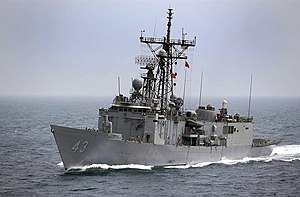USS Thach (FFG-43)

USS Thach in the Persian Gulf, 2003
|
|
| History | |
|---|---|
|
|
|
| Name: | Thach |
| Namesake: | Admiral John Thach |
| Awarded: | 27 April 1979 |
| Builder: | Todd Pacific Shipyards, Los Angeles Division, San Pedro, California |
| Laid down: | 6 March 1981 |
| Launched: | 18 December 1982 |
| Sponsored by: | Mrs. Madalyn J. Thach |
| Commissioned: | 17 March 1983 |
| Decommissioned: | 1 November 2013 |
| Struck: | 15 November 2013 |
| Homeport: | Naval Base San Diego |
| Identification: |
|
| Motto: | "Ready and Able" |
| Fate: | Sunk as part of a sinking exercise on 14 July 2016 during RIMPAC 2016. |
| Badge: |  |
| General characteristics | |
| Class and type: | Oliver Hazard Perry-class frigate |
| Displacement: | 4,100 long tons (4,200 t), full load |
| Length: | 453 feet (138 m), overall |
| Beam: | 45 feet (14 m) |
| Draft: | 22 feet (6.7 m) |
| Propulsion: |
|
| Speed: | over 29 knots (54 km/h) |
| Range: | 5,000 nautical miles at 18 knots (9,300 km at 33 km/h) |
| Complement: | 15 officers and 190 enlisted, plus SH-60 LAMPS detachment of roughly six officer pilots and 15 enlisted maintainers |
| Sensors and processing systems: |
|
| Electronic warfare & decoys: |
|
| Armament: |
|
| Aircraft carried: | 2 × SH-60 LAMPS III helicopters |
| Aviation facilities: | |
USS Thach (FFG-43), an Oliver Hazard Perry-class frigate, was a ship of the United States Navy named for Admiral John Thach, a Naval Aviator during World War II, who invented the Thach Weave dogfighting tactic.
Thach was laid down on 6 March 1981 by the Todd Pacific Shipyards, Los Angeles Division, San Pedro, California; launched on 18 December 1982; sponsored by Mrs. Madalyn J. Thach, widow of the namesake; and commissioned on 17 March 1984 at Long Beach, Cmdr. Dale H. Moses in command.
Thach's mission was to provide anti-air, anti-surface, and anti-submarine protection for carrier battle groups, naval expeditionary forces, replenishment groups, convoys, and other military and merchant shipping. The new direction for the naval service remained focused on the ability to project power from the sea in the critical littoral regions for the world.
Success in the warfare environment of the 1990s and beyond required thorough evaluation, rapid decision-making and almost instantaneous response to any postulated threat. The systems aboard Thach were designed to meet these demanding and dynamic prerequisites, and to do so with minimum human interface. The Sikorsky SH-60 Seahawk's video data link system brought state-of-the-art computer technology to the warfare arena, as well as integrating sensors and weapons to provide a total offensive and defensive weapons system.
In addition, computers controlled and monitored the gas turbine engines (the same engines installed on DC-10 aircraft) and electrical generators. Digital electronic logic circuits and remotely operated valves were monitored in Central Control Station which initiated engine start and resulted in a "ready to go" status in less than ten minutes.
...
Wikipedia
